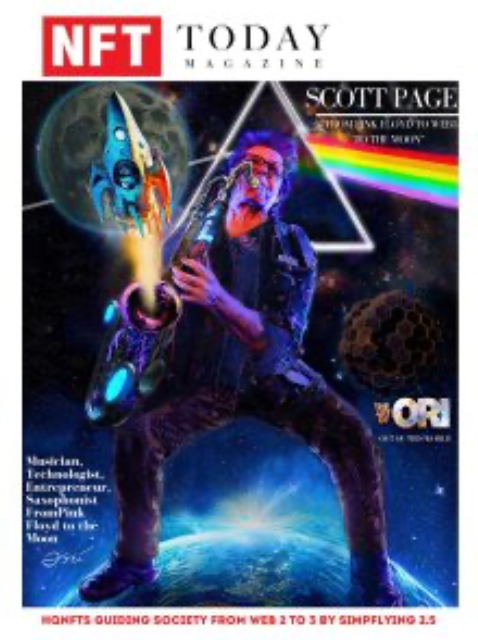She Built Agentic Avatars Before NFTs Were a Thing — Now She Wants You to Own Yourself Online
Staff Writer • 2025-05-02
Preska Thomas, founder of Debit My Data, believes the next frontier of blockchain and AI is individual sovereignty. In a world where everyone is scrambling to train AI, one woman has been training humans to reclaim their value. Long before profile pictures became million-dollar JPEGs and generative AI flooded timelines, Preska Thomas was quietly laying the groundwork for a different kind of digital future — one where you are the most valuable asset on the blockchain. “People think NFTs started in 2017, but I was drafting white papers on identity tokens in 2001,” Thomas said on the Stonks Go Moon Podcast. “Before Satoshi Nakamoto ever published the Bitcoin paper, I was focused on the self as the foundation for a new kind of network — one built on human sovereignty.” Thomas is the founder of Debit My Data, a platform that lets individuals tokenize, secure, and monetize their digital selves — or what she calls agentic avatars. Her idea is simple, yet revolutionary: if companies are making billions by harvesting your clicks, likes, and biometric data, you should be able to earn from it too. From Homeland Security to Blockchain Sovereignty Preska’s unconventional journey began in digital security and Homeland Security consulting. By the early 2000s, she was already experimenting with facial recognition and cryptographic systems for identity validation. She claims she built a working prototype for identity NFTs and ad network monetization tools as early as 2010 — fully documented in timestamped white papers and emails. “My background is in mathematics, systems design, crisis mitigation,” she said. “I’ve always believed that everything is connected — the self, the system, the signals we send online. We’re just now catching up to the idea that our data is an extension of who we are.” Her proof-of-future model — a term she coined — blends elements of proof-of-work and proof-of-stake with a philosophical twist: the future value of a person’s data and digital activity should be considered part of their economic identity. “It’s not just about mining tokens anymore,” she explains. “We’re training large language models with our thoughts, our voices, our photos — every click is labor. So why are we not being paid for that labor?” The Anti-Silicon Valley Strategy Unlike many of her contemporaries, Thomas deliberately avoided raising money during the NFT boom. While platforms like OpenSea and Blur.io were minting fortunes trading cartoon animals, she took a backseat, waiting for the world to mature. “It was tempting to raise VC money in 2017, but I knew that most of it would go into educating people about blockchain,” she said. “Instead, I sent packages — literal blueprints — to people in Silicon Valley who I knew would copy them. And I was fine with that. It sped up the timeline.” She watched, somewhat amused, as speculative frenzy took over the space she had quietly cultivated. “They were obsessed with JPEGs. Meanwhile, I was over here building a system where your selfie could pay your rent.” Now, with the AI boom in full swing and consumers becoming more conscious of their digital footprints, Thomas believes the timing is finally right for Debit My Data. The Rise of the Agentic Avatar So how does it work? Users who join the platform can build a secure, customizable digital avatar embedded with biometric data or visual logos. These avatars — backed by blockchain and an AI engine — can interact with advertisers, platforms, and even employers on a user’s behalf. “If companies are going to build LLMs that monetize your data, shouldn’t you at least own the version of yourself that’s being used to train them?” she asks. “With Debit My Data, you don’t have to pay $20,000 a month for an agentic avatar. You train your own — and it earns for you.” The platform includes its own ad-serving network and cryptographic validation, meaning users can trace interactions, license their data, and receive compensation when their digital likeness or insights are used. It’s also a powerful cybersecurity tool. “Imagine getting an email or message and being able to verify it came from your blockchain-verified avatar — with your logo or face on it,” Thomas says. “No more phishing. No more spoofing.” Owning the Self in a Post-LLM World Debit My Data arrives at a moment of growing unease about AI, data rights, and deepfakes. OpenAI’s own employees have voiced concerns about the uncontrollable direction of generative models. Meanwhile, governments are scrambling to regulate a space that’s moving faster than policy can keep up. Thomas believes regulation isn’t enough. What’s needed is infrastructure — a new protocol layer that centers the individual. “Corporations want our data, our patents, our creativity — and they want it free. That’s not sustainable. We are not pets in a closed system. We’re creators. And we deserve the option to opt-in, to earn, and to own ourselves.” She likens the current moment to the bees in an ecosystem. “We’re pollinating the system with every click and prompt. We’re vital to it. But we need to build something that values that vitality — not extracts it.” A Future Where You’re the Platform As tech giants monetize identity and AI commodifies creativity, Preska Thomas offers a radically different proposition: what if the most valuable platform of all was you? “My solution is not about disrupting — it’s about preserving. Preserving our right to exist as sovereign digital beings in a world that’s being rewritten by AI.” With Debit My Data now live in beta and opening registration for agentic avatars, the next digital gold rush might not be about what you buy, but who you are.
See More Posts
A look at how NFTS, Web 3, Gaming, Cryptocurrencies and Blockchain are reshaping businesses across the globe.
@NFT Today Magazine


